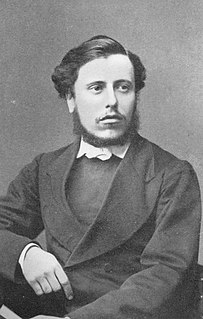A Quote by Elizabeth Gaskell
I take it that 'gentleman' is a term that only describes a person in his relation to others; but when we speak of him as 'a man,' we consider him not merely with regard to his fellow-men, but in relation to himself,--to life--to time--to eternity.
Related Quotes
A certain ultra-dignified gentleman of unusual prominence carried himself so stiffly that nobody felt free to call him by his first name. He quarreled with a friend of earlier days and from then on the two never spoke. The day the friend died an associate found the ultra-dignified gentleman staring through the window. When he came out of his reverie, he soliloquized with a sigh, ""He was the last to call me John."" Is any man really entitled to regard himself a success who has failed to inspire at least a goodly number of fellow mortals to greet him by his first name?
So long as men desire to live together, no man may initiate the use of physical force against others. . . . When a man attempts to deal with me by force, I answer him by force. It is only as retaliation that force may be used and only against the man who starts its use. No, I do not share his evil or sink to his concept of morality: I merely grant him his choice, destruction, the only destruction he had the right to choose: his own.
Those who merely possess the goods of fortune may be haughty and insolent; . . . they try to imitate the great-souled man without being really like him, and only copy him in what they can, reproducing his contempt for others but not his virtuous conduct. For the great-souled man is justified in despising other people - his estimates are correct; but most proud men have no good ground for their pride.
Patriotism, or the peculiar relation of an individual to his country, is like the family instinct. In the child it is a blind devotion; in the man in intelligent love. The patriot perceives the claim made upon his country by the circumstances and time of her growth and power, and how God is to be served by using those opportunities of helping mankind. Therefore his country's honor is dear to him as his own, and he would as soon lie and steal himself as assist or excuse his country in a crime.
The patient man is merry indeed.... The jailers that watch him are but his pages of honour, and his very dungeon but the lower side of the vault of heaven. He kisseth the wheel that must kill him; and thinks the stairs of the scaffold of his martyrdom but so many degrees of his ascent to glory. The tormentors are weary of him. the beholders have pitty on him, all men wonder at him; and while he seems below all men, below himself, he is above nature. He hath so overcome hlmself that nothing can conquer him.
As time passed and he grew to know people better, he began to think of himself as an extraordinary man, one set apart from his fellows. He wanted terribly to make his life a thing of great importance, and as he looked about at his fellow men and saw how like clods they lived it seemed to him that he could not bear to become also such a clod.






































